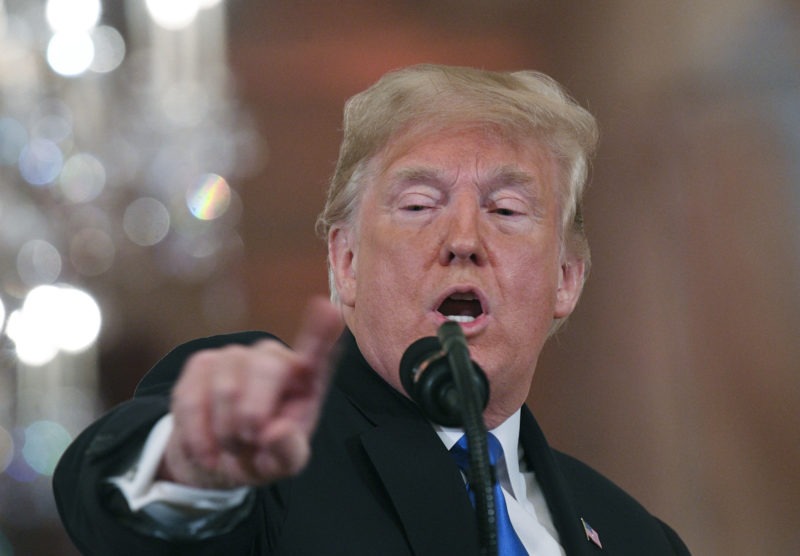Trump’s revolving door: Coats is latest to go
US President Donald Trump’s administration has seen significant turnover among senior officials (Jim WATSON)
Washington (AFP) – US Director of National Intelligence Dan Coats is leaving his post after a tenure in which he was regularly at odds with President Donald Trump.
Dozens of White House aides — from attorney general Jeff Sessions to press secretary Sean Spicer and chief of staff Reince Priebus — have either left or been sacked from their positions since Trump took office on January 20, 2017.
Here is a sampling of senior departures:
– Intelligence chief Dan Coats –
Dan Coats, who previously served in the US Senate and the House of Representatives, was viewed as apolitical and enjoyed bipartisan support, but did not see eye to eye with Trump on a range of issues and at times appears to have been kept in the dark by his administration.
He backed the US intelligence community’s conclusion that Russia interfered in the 2016 election that brought Trump to office — something the president was long loath to acknowledge — and also disagreed with his decision to hold a two-hour closed-door meeting with Russian President Vladimir Putin in 2018.
Coats also said he does not believe that North Korea is willing to give up its nuclear arsenal, as the president does, and has warned that the Islamic State group — despite Trump’s assertions to the contrary — was hardly vanquished and could easily rise again.
– Homeland Security chief Kirstjen Nielsen –
Kirstjen Nielsen previously served as a cyber security specialist in the Department of Homeland Security (DHS), then as assistant to Trump’s first DHS secretary, John Kelly.
When Kelly moved to the White House as Trump’s chief of staff in July 2017, Nielsen went with him as his deputy — but by October was back at DHS, this time as secretary.
She would become the front-line defender of the administration’s immigration policies and the face of its widely condemned practice of separating migrant children from their parents.
Despite remaining steadfast in her loyalty, her ability was long said to have been questioned by Trump and her eventual departure — coming months after her mentor Kelly’s resignation — was not a shock.
– Interior Secretary Ryan Zinke –
Ryan Zinke, a former Navy SEAL and ex-member of the House of Representatives, was one of the main executors of Trump’s efforts to reduce environmental protections in the United States. He left at the end of 2018.
He managed to hold onto his post for some two years despite a series of scandals over expenditures, including reports that his department was spending nearly $139,000 to upgrade three sets of double doors in his office — a cost he later said he negotiated down to $75,000.
– Chief of staff John Kelly –
John Kelly, a retired four-star Marine Corps general, has been credited with helping restore a degree of order to the often-chaotic Trump White House before his exit at the end of 2018.
But in the process he clashed with members of the Trump clan, and at times infuriated Democrats with his blunt comments.
Kelly made it known he did not always love the job — one of the most vital in any White House — quipping, “God punished me, I guess.”
– Attorney General Jeff Sessions –
Jeff Sessions, a Republican senator from Alabama, was the first member of the Senate to back Trump’s insurgent bid in 2015 for the Republican presidential nomination.
Trump rewarded Sessions by naming him to head the Department of Justice.
But relations quickly soured after Sessions recused himself from Special Counsel Robert Mueller’s probe into whether the Trump presidential campaign colluded with Russia to get him elected.
Trump personally attacked Sessions on several occasions for failing to protect him from the Mueller probe.
– UN Ambassador Nikki Haley –
Nikki Haley, who left the administration at the end of 2018, was a shining star from the start.
Thrust onto the international stage, she quickly became an astute advocate for Trump’s foreign policy, using forceful language against North Korea, Syria and Iran.
The former South Carolina governor was also unafraid to speak her mind, often in fairly undiplomatic language, and built a reputation for standing up to Trump when she felt it was warranted.
Her aggressive criticism of Russia won plaudits, even as she stepped beyond the position held by the White House.
– Environment chief Scott Pruitt –
Environmental Protection Agency head Scott Pruitt’s tenure was beset by scandal, and Trump pushed him out in July 2018.
A former Oklahoma attorney general with ties to fossil fuel industries, Pruitt was accused of using his position to enrich his family’s lifestyle in violation of federal law.
– Secretary of State Rex Tillerson –
Rex Tillerson was fired by Trump in March 2018, ending a rocky tenure for the former Exxon chief executive as the nation’s top diplomat.
Tillerson was frequently at odds with the mercurial president. They notably disagreed on the Iran nuclear deal, from which Trump withdrew in May 2018.
During his brief stay at Foggy Bottom, Tillerson frequently found himself out of the loop and caught unawares by policy shifts announced in Trump tweets.
In one of his first public criticisms of the president since stepping down, Tillerson told a gathering in Texas in December 2018 that Trump was undisciplined, did not like to read briefing papers and sometimes asked him to do things that were illegal.
Trump shot back on Twitter that Tillerson was “dumb as a rock.”
– Chief strategist Steve Bannon –
The architect of Trump’s nationalist-populist campaign and his election victory, White House chief strategist Steve Bannon was nicknamed the Prince of Darkness and the Shadow President.
His economic nationalism became the lynchpin of Trump policies, even as many of Bannon’s other ideas were rebuffed by policy rivals.
Bannon’s constant clashes with other advisors became untenable, as did his ties to the extreme right. He left in August 2017.
– National Security Advisors Flynn, McMaster –
Michael Flynn, a retired lieutenant general, was being investigated for his contacts with Russians and eventually pleaded guilty to lying to the FBI.
He lasted only 22 days as national security advisor.
Flynn’s replacement, HR McMaster, also a lieutenant general, lasted barely a year.
He never really clicked with the president, who bristled at McMaster echoing the US intelligence establishment consensus that Russia meddled in the 2016 election.
Disclaimer: Validity of the above story is for 7 Days from original date of publishing. Source: AFP.


